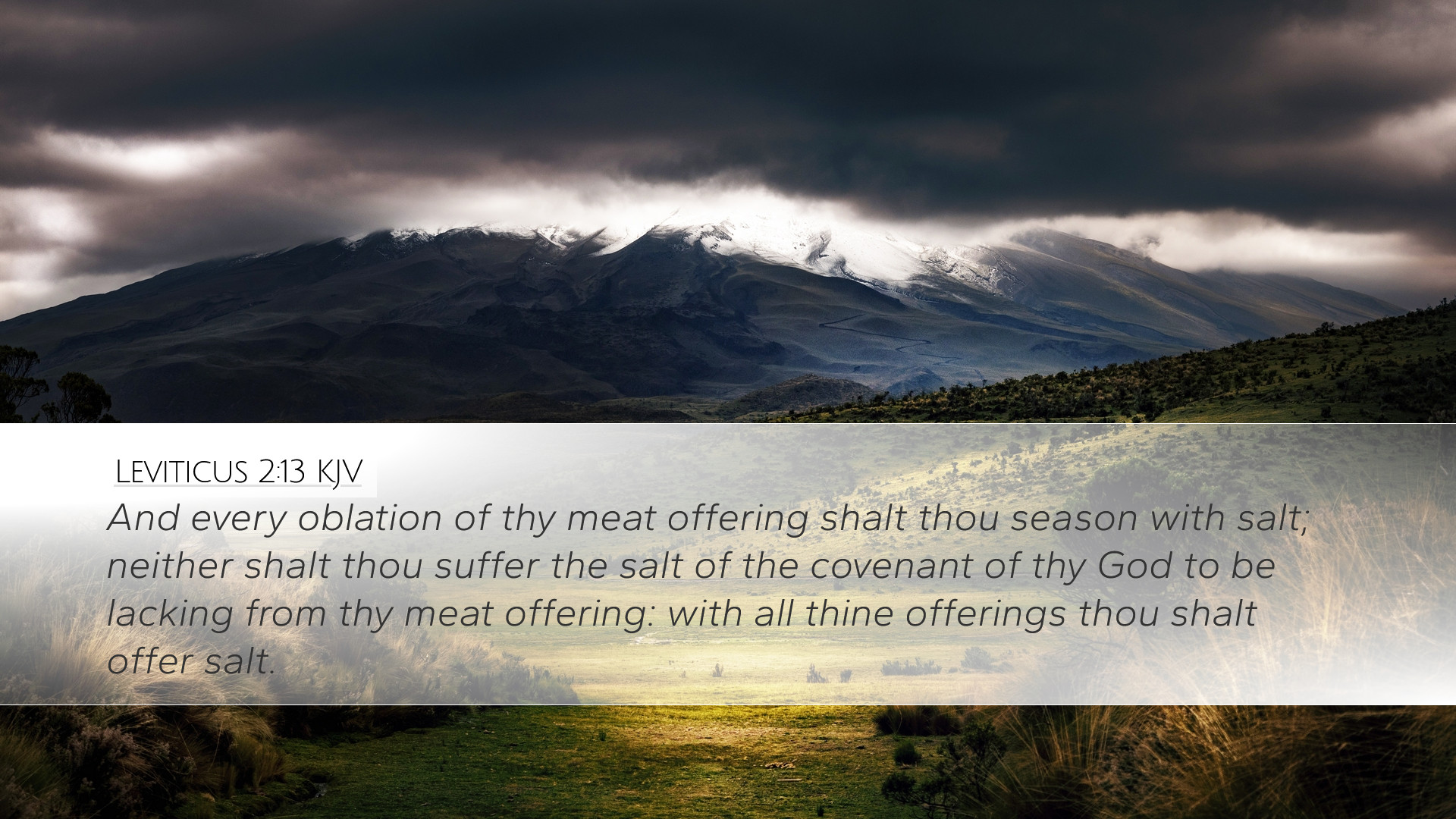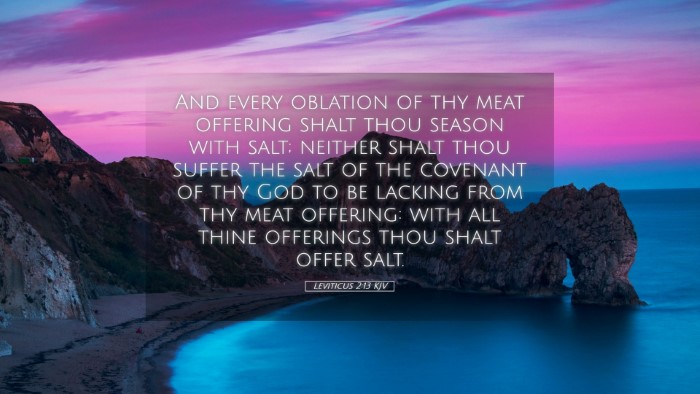Bible Commentary on Leviticus 2:13
Verse: "And every oblation of thy meat offering shalt thou season with salt; neither shalt thou suffer the salt of the covenant of thy God to be lacking from thy meat offering: with all thine offerings thou shalt offer salt." (Leviticus 2:13 KJV)
Introduction
The verse from Leviticus 2:13 holds significant theological and practical implications regarding the offerings made to God. It emphasizes the importance of salt in the sacrifices and its symbolic representation in the covenant relationship between God and His people. The following commentary draws insights from renowned public domain commentators such as Matthew Henry, Albert Barnes, and Adam Clarke.
Significance of Salt
1. Historical Context
Salt was a common preservative in ancient times, essential for food preparation and preservation. Its inclusion in the offerings signifies purity, preservation, and the necessity for offerings to be presented in a manner that honors God.
2. Symbol of Covenant
According to Albert Barnes, the salt of the covenant embodies the enduring nature of God's promises. Salt was used in covenant-making ceremonies, representing the commitment and fidelity required in a relationship with God. This notion is echoed in the commentary of Adam Clarke, who elucidates that salt serves as a reminder of the sacredness and permanence of God’s covenant with His people.
3. Symbolic Meaning in Offerings
Matthew Henry notes that the seasoning of offerings with salt indicates a divine expectation for the worshipper's heart and intentions. It underscores the necessity of sincerity and devotion when presenting gifts to God. The absence of salt renders the offering unacceptable, pointing towards the importance of maintaining a right heart in worship.
Application for Worship and Service
1. Quality of Offerings
The exhortation to season every meat offering with salt speaks to the quality of offerings we give. It invites pastors, students, and theologians to reflect on the quality and intention behind their acts of worship and service in God’s house. Barnes emphasizes that offerings should not only be outwardly acceptable but also inwardly pleasing to God, indicating the condition of the heart behind the sacrifice.
2. Spiritual Preservation
Salt also represents preservation in Christ. As believers partake in spiritual offerings, the use of 'salt' can be understood as an imperative to remain steadfast in truth and righteousness. Clarke articulates the idea that just as salt preserves food, believers must be agents of preservation in society, embodying the values of the Kingdom of Heaven.
3. Impactful Example for Others
The application extends to the church at large, where spiritual 'saltiness' can influence communities. Henry infers that the church's offerings of worship should enhance its witness to the world, effectively demonstrating the transformative power of the Gospel.
Theological Insights
1. Doctrine of Covenants
The recurring theme of God’s covenants throughout scripture invites an understanding of how salt reflects God’s desire for an enduring relationship with humanity. Salt signifies the commitment from both parties, implying that worship involves recognizing our part in the covenant. The commentary underscored by Clarke emphasizes that God desires His people to engage actively and sincerely in that covenantal relationship.
2. Christ as the Fulfillment
In exploring the connections to the New Testament, this verse foreshadows the role of Christ in providing the true 'meat offering.' His sacrifice is seasoned with the 'salt' of purity and righteousness, fulfilling the law. Barnes insightfully connects this verse to the teachings of Jesus, where he refers to His followers as the 'salt of the earth' (Matthew 5:13), calling them to preserve righteousness and influence the world positively.
Conclusion
Leviticus 2:13 serves as a profound reminder that every aspect of our worship must be intentional and meaningful. The seasoning of offerings with salt reflects a deeper spiritual truth—our need to present ourselves as living sacrifices, infused with grace and commitment to God’s covenant. As we meditate on this verse, we are charged to ensure that our offerings—be they of time, service, or devotion—are enriched with sincerity and set apart for God's purposes. The scholarly insights provided by Henry, Barnes, and Clarke enrich our understanding of this practice, framing it within the broader narrative of God's ongoing work among His people.


